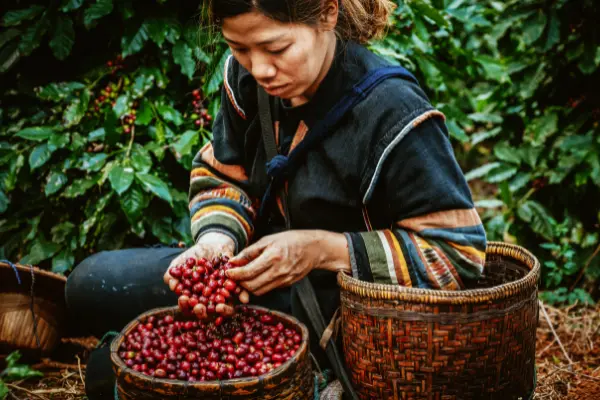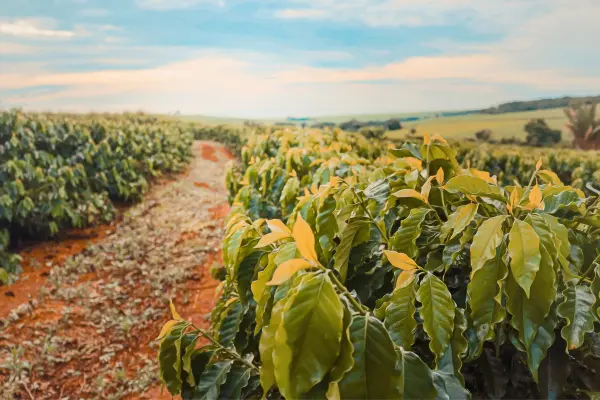5 Benefits Of Drinking Organic Coffee; Science Weighs In
Disclosure: This post contains affiliate links and I may earn a small commission (at no extra cost to you) if you click through and make a purchase. Thanks in advance – I really appreciate it!
With over 200 pesticides used on conventionally grown coffee crops, non-organic coffee is one of the most heavily chemically treated crops of any agricultural commodity in the world.
Whereas, organic coffee is the coffee that is grown and processed without the use of most synthetic chemicals.
Key Takeaways:
- Organic coffee is cultivated without using chemicals.
- Organic coffee contains more nutrients than non-organic.
- Organic coffee is safer for the farmers.
- Organic coffee is better for the environment.
- Organic coffee is fresher than non-organic coffee.
With over 200 pesticides used on conventionally grown coffee crops, non-organic coffee is one of the most heavily chemically treated crops of any agricultural commodity in the world.
Whereas, organic coffee is the coffee that is grown and processed without the use of most synthetic chemicals.
Organic coffee is not just beneficial for your health but it’s good for the environment too, as it comes from farms that prioritize sustainability, renewable resources and preserving the quality of the land, groundwater, and air, which is all verified by official USDA NOP representatives. Here are 5 benefits of choosing organic coffee over non-organic.
Organic Coffee Benefits
1) Organic Coffee is Cultivated Without Using Chemicals.
Drinking organic coffee reduces the amount of chemicals in your diet namely persistent pesticides. The use of insecticides, fungicides, fertilizers and weed killers are strictly monitored in organic coffee production.
Organic coffee farming produces healthy coffee without the use of toxic pesticides. While some organic coffee farmers do use pesticides they are primarily derived from natural substances.
These natural pesticides must be approved for organic production. The National Organic Standards Board, or NOSB, and the National Organic Program, or NOP. maintain a list of materials approved for use in organic production.
A 2014 meta-analysis in the British Journal of Nutrition found that because of differences in fertilization techniques, organically grown coffee was 48% less likely to test positive for cadmium, a toxic heavy metal that accumulates in the liver and kidneys.
2) Organic Coffee Contains More Nutrients than Non-Organic.
100% certified organic coffee contains vitamins, minerals, enzymes, micronutrients and antioxidants needed by the body for several health benefits such as protection from cell damages and boosting the immune system.
Pure organic caffeine in strong coffee acts as an energy booster and enhances proper functioning of the brain.
Organic nutrients found in coffee are also effective for reducing stress, increasing your mood and boosting your metabolism.
Cleaner coffee means cleaner diets which leads to a cleaner bill of health.

3) Organic Coffee is Safer for the Farmers.
Organic coffee farming doesn’t expose neighboring communities and farmworkers to dangerous persistent pesticides.
Farmers are at great risk for exposure to agricultural pesticides and the adverse health impacts that can occur as a result.
Neighbors are also at risk for exposure through pesticide drift if they live near a big coffee farm or a conventionally managed park or playing field. Pesticide drift is a threat to human health as well as to wildlife and ecosystems.
This 2018, Organic Center report details the impacts of the conventional use of synthetic pesticides on farmer and farmworker health, and how organic coffee farming can be used as a model to decrease the exposure of this important part of our society.
4) Organic Coffee is Better for the Environment.
Organic coffee farming practices may reduce pollution, conserve water, reduce soil erosion, increase soil fertility, and use less energy. Farming without synthetic pesticides is also better for nearby birds and animals as well as people who live close to farms.
Organic coffee farming rebuilds soil health and stops harmful chemicals from getting into our water supplies. Water and soil are two extremely important resources necessary for growing food.
Organic coffee farming also results in greater biodiversity, and releases fewer greenhouse gas emissions.
Choosing organic coffee also protects the streams and lakes downstream from toxic runoff that conventional farming produces.
5) Organic Coffee is Fresher Than Non-Organic Coffee.
Since organic coffee doesn’t contain preservatives that make it last longer. The coffee is sometimes (but not always, so watch where it is from) produced on smaller farms nearer to where it is sold.

Is Organic Coffee Healthy?
Organic coffee is a much healthier option compared to non-organic coffee. Organic coffee beans are richer in healthful nutrients, antioxidants & minerals such as riboflavin, pantothenic acid, potassium, magnesium and niacin. Organic coffee also contains trace amounts of vitamins B1, B2, B3, and B5.
Moreover no synthetic fertilizers or chemicals are used in growing or production of organic coffee.
The coffee is grown with only organic fertilizers, like coffee pulp, chicken manure, or compost.
What Is The Healthiest Organic Coffee?
Brewing a pot of coffee at home is a great choice as you have total control over the quality of your beans. Still, the number of different organic coffee brands to choose from can be totally overwhelming.
Luckily, we’ve done a lot of vetting of organic coffee brands to make it easier for you. Here are some of our favorite organic coffee bean choices that you can buy from Amazon.
Is Organic Coffee Better for Your Stomach?
Organic coffee is better for your stomach as it is less acidic than regular coffee. Some organic coffee brands offer coffee that is 70% less acidic than the regular coffee. Organic coffee is perfect for people who suffer from things like indigestion. The lower acid content is good for your teeth too.
Does Organic Coffee Taste Different?
Most people believe that organic coffee tastes better than regular non-organic coffee. Although the difference in taste is subtle, some say organic coffee tastes much smoother. This could be because most organic coffee ripens more slowly and develops a richer, more complex flavor. This is why high-altitude coffee is so highly prized.
Is Organic Coffee Worth it?
Organic coffee is worth the cost as it tastes better, it’s better for you, and it’s better for the environment. Unfortunately, organic products are expensive, and for a lot of people, the benefits might not justify the cost. But if you’re passionate about your health, environmental stability and great tasting coffee, you’ll find it to be well worth your money.
Trying to make a decision about what kind of coffee to get before you’ve had your coffee can be tricky, we get it. And if you’re feeling bleary-eyed and eager for that caffeine jolt, we understand the temptation to just order a cup of whatever’s closest, no questions asked.
But we’ve done the research, and it’s clear that the kind of coffee you buy, and the amount you drink, has a major impact on your health and the planet.
Luckily, we’ve made it simpler for you to make informed choices by breaking down everything you needed to know about organic coffee and how it compares to non-organic regular coffee, and giving you our best organic coffee recommendations.

Amit Gupta
Hi, my name is Amit Gupta, and I am the owner and contributor at Cafeish. My obsession with coffee started when I received my first French press as a gift almost ten years ago. Since then, my love of coffee – and the number of coffee gadgets I own – has grown considerably.
Most Popular
ABOUT US
We are a team of coffee affcianados with experience and expertise in making world renowned coffee. In fact, preparing the best coffee ever with a fluffy top reminds us of magic, with secrets of how to achieve each particular effect. Making coffee is not our only hobby, we always keep our ears open as to what’s happening around and what scientists and manufacturers produce for consumers. It’s not an easy task to do – it’s rather time consuming. Hence, Caféish website was launched.
LEGAL DISCLAIMER
Caféish is a participant in the Amazon Services LLC Associates Program, an affiliate advertising program designed to provide a means for sites to earn advertising fees by advertising and linking to Amazon.com. Caféish also participates in affiliate programs with Clickbank and other sites. Caféish is compensated for referring traffic and business to these companies.




